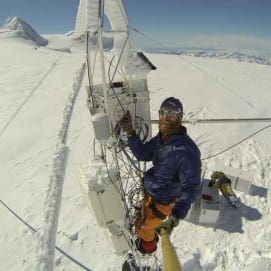
Despite denials to the contrary by some high profile decision makers, global climate change most certainly exists. It is caused by human activities and requires urgent action before the repercussions become irreversible. Excessive greenhouse gases like carbon dioxide and methane in our atmosphere as a result of fossil fuel combustion are more than the natural world can absorb, trapping heat and rising global temperatures.
Rising sea levels, retreating glaciers, and more intense heat waves are just some evidence of how global warming is already affecting populations, forcing regions like New York City to plan for inevitable displacement. Students in environmental science colleges understand the causes and consequences of climate change better than most. In Unity College’s Online Masters in Professional Science, sustainability students explore, debate, and research this issue from various perspectives to develop mitigation and adaptation strategies.
Here are 3 key areas where sustainability science students can focus climate action efforts.
Clean Energy Opportunities Considered in Environmental Science Colleges
Substantial scientific evidence suggests that a global average temperature increase of more than 2 degrees Fahrenheit above current levels will result in severe implications for natural systems and human health. Delays in making substantial reductions to heat-trapping emissions now will force even more difficult and costly cuts. Eliminating the burning of coal, oil, and eventually natural gas is no easy task, as our society is deeply connected to these fossil fuels, but it’s essential for making serious progress in combating climate change.

Unity College is a national leader in this goal as the first American higher education institution to divest from fossil fuel investments, demonstrating a collective commitment to address climate change with systematic, comprehensive, and scientifically informed policies. Renewable energy sources like solar, wind, geothermal, hydroelectricity, and biofuels (produced from crops) are becoming increasingly viable on a large-scale, with improving cost-effectiveness and policy momentum. Many regions already run their grids almost exclusively with renewable energy.
Improving Emissions Standards with a Masters Degree in Environmental Science
Graduates with a Masters degree in environmental science will quickly find that the main obstacles in shifting to low-carbon energy strategies are not technical or economic, but political. Sustainability science students become effective change agents by combining technical and social science skills within the context of economic, political, and cultural concerns. Focusing on immediate benefits like creating clean energy jobs, improving the liveability of cities and the safety of air and water can help motivate productive action.
Improving efficiency in our homes, businesses, industry, and transportation has vast potential to save both energy and money—it’s truly a win-win situation. Powering, heating, and cooling our buildings are the largest contributors to global warming. Research and implementation of emerging battery technologies, solar cell materials, and other innovative energy sources could yield important breakthroughs while establishing stricter emissions standards and fixing methane leaks are other positive steps in this direction.
Protecting Forests and Other Climate Solutions Studied in Online Environmental Degrees
Rather than pushing for drastic changes in one area, some researchers call for reducing greenhouse gas emissions from numerous sources or “stabilization wedges.” Besides improving energy efficiency and fuel economy, capturing released carbon dioxide and storing it underground—called “carbon sequestration”—could provide at least some short-term gains.
Of course, plants and trees absorb carbon naturally, so increasing forestlands and improving our food production practices can definitely help address climate change. Wildlife and ecosystem conservation is valuable work conducted by natural resource managers following studies at environmental science colleges, who can integrate a transdisciplinary process for managing habitat disruption and climate change.
Are you interested in fighting climate change by pursuing online environmental degrees?
Contact Unity College Online for more information about getting the training and credentials you need to advance in your career path.



